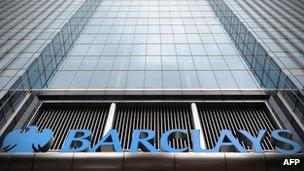Barclays: Winters and O’Donnell tipped for top jobs
- Published
- comments

Who will fill the top jobs at Barclays?
From my conversations with senior Barclays sources, I have learned there is a favoured candidate for each of its top vacancies.
The former head of the civil service, Lord O'Donnell, is the board of the bank's preferred choice as new chairman.
And Bill Winters, the former JP Morgan banker, is the front-runner to succeed Bob Diamond as chief executive of the bank.
There is only one proviso (quite an important one): neither has been formally offered the positions (it is too early in the process) and it is not clear whether either would actually take it.
Why do they stand out among potential candidates? Well it is partly for their track records and partly because they are seen as acceptable to the Bank of England, the chancellor and the FSA (with a caveat, as per below) - a constituency which, in the light of the Libor scandal, is regarded as particularly important.
In Mr Winters' case, he is currently conducting an internal review for the Bank of England into one aspect of its performance since the 2008 financial crisis. And he was a member of the Independent Commission on Banking, set up by the chancellor, which recommended that a ring fence be put around the retail banking operations of giant universal banks like Barclays.
What however makes Mr Winters appealing for the Barclays board is that he is a former investment banker who eschewed much of the reckless behaviour of his contemporaries. As I mentioned in an earlier note, as co-head of JP Morgan's investment bank he sounded an alarm that the risks being taken by its Chief Investment Office (CIO) - the part of the bank that recently announced a loss of more than $5bn - were not transparent enough (and see here for more on Mr Winters).
His vocal unhappiness at the governance of JP Morgan's CIO, that it was a discreet trading operation answerable only to the chairman Jamies Dimon, and whose deployment of the bank's precious capital could not be scrutinised by other senior executives, was one of the reasons Mr Winters was pushed out of the bank in the summer of 2009 - which now looks like a badge of honour.
Here is the thing: Barclays' investment banking operations are so huge and complicated that its board is concerned that reforming its culture requires an investment banker to be at the helm of the bank; and the point about Mr Winters is that he is felt to be someone who would have the expertise and credibility to carry out those reforms.
Barclays' board cannot think of many other potential candidates who would both have the reforming zeal and would be able to command the respect of the bank's serving investment bankers (Richard Meddings of Standard Chartered is someone whose name is also under consideration).
Outsiders in
Oh, and by the way, it is clear to me that Barclays has concluded - following the decision last Thursday of its deputy chairman Sir Mike Rake to notify his colleagues that he no longer wishes to be considered for the chairman's job - that both the role of chairman and chief executive will be filled by outsiders.
Mr Winters' appointment would not be uncontroversial. After all, to state the bloomin' obvious, he is an investment banker - who, as a breed, are not flavour of the month. And he is American.
So one American investment banker, Mr Winters, would be replacing another, Mr Diamond. If acerbic comments in the Daily Mail matter to Barclays' non-executives, they will pause for a moment before offering him the post.
There is also another complication with his appointment. He has set up a business, and buying him out of it might be expensive and controversial.
As for Lord O'Donnell, his record as head of the civil service and as a policymaker is widely respected.
His problem (to make another unbelievably obvious point) is that he is not a banker, although he is currently working as an adviser to Canada's AAA rated TD Bank. And when he was head of the treasury, he took a close interest in financial regulation.
Given that the FSA has said it wants only those with knowledge of banks to serve on banks' board, it is not clear if Lord O'Donnell passes the FSA expertise threshold. It would be quite something if the FSA said the erstwhile most powerful individual in Whitehall was not capable of overseeing a bank.
UPDATE 15:20 BST
My strong sense is that the FSA would approve the appointment of Lord O'Donnell as chairman of Barclays, were he to be formally offered the job.